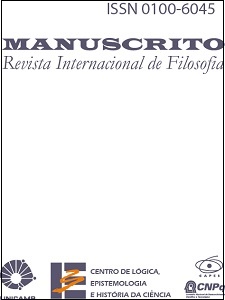Resumen
Es razonable pensar que una parte relevante del trabajo del lógico consiste en elucidar ciertos conceptos teóricamente valiosos pero, si se los evalúa desde el punto de vista de la claridad y el rigor, aún insatisfactoriamente caracterizados. Estos procesos elucidatorios pueden modelarse de formas muy variadas; el núcleo de los mismos, no obstante, reside en la construcción de un concepto más riguroso que funge como clarificación o elucidatum de un concepto previo. El concepto matemáticamente preciso de “demostración” puede considerarse un posible elucidatum del respectivo concepto intuitivo. ¿Es un elucidatum adecuado? ¿Bajo qué condiciones lo es? ¿Cómo repercute asumir tal éxito elucidatorio en nuestra concepción filosófica de la demostración? Chateaubriand no plantea, explícitamente, el problema en términos elucidatorios; sin embargo, sugeriremos que enmarcar su reflexión en
Abstract: A relevant aspect of a logician’s work consists in elucidating certain concepts that, however theoretically valuable, are yet to be sastifactorily characterized from the point of view of rigor and clarity. Although these elucidatory processes can be modeled on several ways, its nucleus resides in the construction of a more rigorous concept that acts as clarification or elucidatum of a previous concept. The mathematically precise concept of “demonstration” can be considered as a possible elucidatum of the respective intuitive concept. Is it an adecuate elucidatum? How does assuming such an elucidatory success affect our philosophical conception of the demonstration? Although Chateaubriand does not explicitly pose the question in elucidatory terms, I will suggest that framing his reflection in such a context can provide a new perspective of his lucid analysis.
Keywords: Philosophy of mathematics. Demonstration. Elucidation. Elucidatory models.
Citas
ALLWEIN, G., BARWISE, J. (eds.). Logical Reasoning with Diagrams. Oxford: Oxford University Press, 1996.
BARWISE, J., ETCHEMENDY, J. “Visual Information and Valid Reasoning”. In: G. Allwein and J. Barwise (eds.) (1996), pp. 3- 12.
CHATEAUBRIAND, O. Logical Forms. Part II: Logic, Language and Knowledge. Campinas: UNICAMP, 2005. (Coleção CLE, v. 42) LASSALLE CASANAVE, A. “La concepción de demostración de Oswaldo Chateaubriand”. Manuscrito, v. XXII, n. 2, pp. 95- 107, 1999.
SEOANE, J. “The Concept of Mathematical Elucidation: theory and problems”. CLE e-prints (Section Logic), v. 6, n. 4, pp. 1-21, 2006. Dirección electrónica: http://www.cle.unicamp.br/e-prints/vol_6,n_4,2006.html SIMPSON, T.M. “Análisis y eliminación: una módica defensa de Quine”. Crítica, v. VII, n. 21, pp. 69-83, 1975.
TARSKI, A. [1936] “On the Concept of Logical Consequence”. In: A. Tarski (1956), pp. 409-420.
TARSKI, A. Logic, Semantic, Metamathematics. Oxford: Clarendon Press, 1956.

